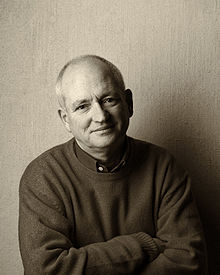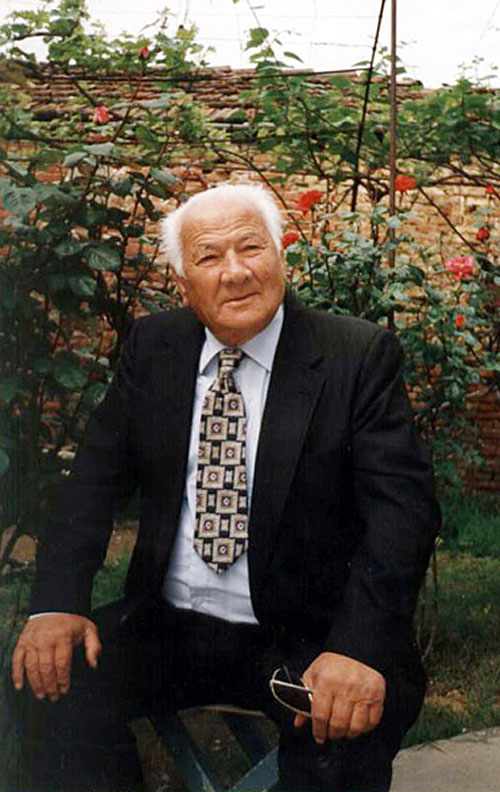
Lazër Radi – The Autumn of 1944 – Robert Elsie
Born in Prizren, Lazër Radi (1916-1998) moved with his family to Shkodra in 1938 when his family was forced by the Serb authorities to flee. After secondary school in Shkodra, he studied law in Rome in 1942 and finished his articles there in 1944. The young Radi was caught up in the popular enthusiasm that reigned throughout Italy for Benito Mussolini and his fascist movement. Much to his later distress, the Italian Foreign Ministry published some of Radi’s early writings on the subject in a now rare volume entitled ‘Fashizmi dhe fryma shqiptare’, Tirana 1940 (Fascism and the Albanian Spirit), with an introduction by Neo-Albanianist Vangjel Koça. Radi was arrested on 23 November 1944 for his brief and youthful interest in the politics of the time, a few days after communist forces entered Tirana, and was sentenced in April 1945 at the Albanian Treason Trial (Special Court) to thirty years in prison. Released in April 1954, he was immediately resentenced to twenty years of internment and was dispatched to do the usual rounds in the infamous internment villages in the Kurvelesh region and on the mosquito-infested Plain of Myzeqeja around Lushnja. His children and his grandchildren, born in internment, were deprived of the right to more than elementary education and of jobs other than tilling the soil. He and his family were only released when the communist dictatorship fell in 1991, after he had spent forty-six years in prison and internment! Despite constant surveillance during his internment, Lazër Radi wrote secretly, hiding his manuscripts in a rubber container buried in the earth. Among his surviving works is a book on the treason trial of March-April 1945 at which he was convicted, and the events that led up to it. In the following passage, he describes his initial arrest in Tirana in the autumn of 1944.

When my wife and I got back home, everything had returned to normal. The Germans were gone, but now we would have to deal with the ‘Albanian’ Germans who in custom and fury were worse than any terrorist.
It was in fact a surprise that the victory over the invaders and the ‘liberation’ of Tirana did nothing to tame the savage spirits of these men who had come down from the mountains. Most of them were upstart partisans, men who had joined the movement at the last moment when there were no more Germans in Albania and the only form of German resistance was in their imagination.
These upstarts were much more dangerous than the real partisans. In their endeavours to gain credibility, to be more Catholic than the Pope, they behaved ridiculously and lost any sense of respect.
I spent November 18-23 sitting at my window and observing the activities of the partisans who were arresting people in the various buildings of the Lana apartment complex. Everyone knew that the buildings were inhabited primarily by public figures and government officials. It was thus not unusual that the ‘victors’ coming down from the mountains, decorated with lice, would focus their attention on these four apartment buildings.
From the kitchen window I could see how the indiscriminate arrests were carried out. Men were being taken way so that their families would leave the apartments, which had certainly already been set aside for leading figures among the forces coming down to the Albanian capital. I sensed the danger coming ever nearer and kept as quiet as a mouse, staring all the time out the window to keep abreast of what was going on. One by one, all the public servants and functionaries of the former government were being arrested. I reminded myself from time to time that I had not carried out any particularly important function and therefore had no cause to be afraid. However, I could not forget the fact that my family and I owned a six-room apartment with two bathrooms, a well-equipped kitchen, heating and an independent water supply, as well as two good rooms in the basement. It would make excellent luxury accommodation for any figure of note coming down from the mountains,

On 23 November, I decided to go out and present myself to a fellow whom I had observed coming around regularly with two or three partisans. Whenever he saw anyone whom he knew inhabited the Lana apartments, he would call them over, and his partisans would escort them to a house on the other side of the Lana Bridge. From there, of course, other guards would take them off to their destination, i.e. prison.
In the days that I kept watch from the kitchen window, I had noticed that the man who was in charge of arresting the inhabitants of the Lana apartment buildings was an old acquaintance of mine from secondary school in Shkodra, Abaz Sali Shehu. He descended from a family of sheikhs in Dibra, and was now in charge. I could see Abaz approach people, accompany them over to the other side of the river, and they would never return.
On 23 November, I noticed Abaz coming in the direction of our building. I rushed to the door and stepped out, as if to meet him coincidentally. He recognized me right away as we had lived together at the Malet Tona school residence. We were in the same class and graduated together. The door was open, and there we stood, face to face.
“Hey, Lazër, you live here?”
“Where else would I be?”
“Nice to see you.”
He continued up the stairs, and I went back into my apartment, wanting to track his further movements from the window. He appeared in the courtyard after a short while and set off down the road in the direction of New Tirana.At two o’clock in the afternoon, Abaz and Mero Lamçe were back, together with three partisans armed with sub-machine-guns. They were heading towards our staircase. I had no doubt that they had come for me. The bell rang. My wife went to the door. It was Abaz Sali Shehu.
“Is Lazër around?”
“Yes.”
“Could you ask him to come out? Someone at the staff headquarters has a question for him.”
It was a cold day and I was warmly dressed. I took off my cardigan and put on my heavy overcoat, thinking that I could use it as a blanket if I had to. I buttoned it up tight and went out the door.”
[Extract from: Lazër Radi, I pari gjyq special në Shqipëri. 1 mars 1945 – 13 prill 1945 (Tirana 1997). Translated from the Albanian by Robert Elsie.]
Marre nga Albanian History